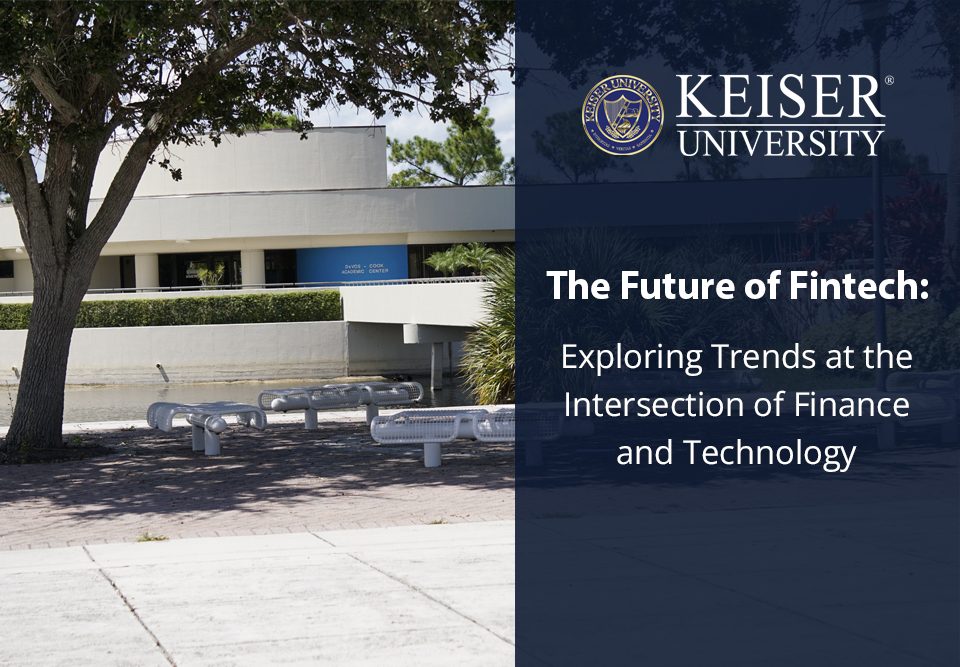You don’t need to spend long studying the fintech industry to understand that it is constantly evolving. New fintech trends seem to emerge around every corner, changing the way we use financial services and technology in our everyday lives.
The year 2023 saw plenty of exciting new trends in fintech, ranging from the increased use of AI to neobanking and more. Looking toward 2024 and beyond, only time will tell what the future holds for this dynamic industry. However, there are some reasonable predictions we can make for the top fintech industry trends.
If you’ve been considering a career in fintech, being aware of these trends and how they affect businesses and consumers alike can help prepare you for the nuances of this competitive field.
Fintech Trends
Before we dive into some of the top fintech industry trends of the coming years, it’s essential to look at the field and its impact on our everyday lives. From the way we do business to the way we pay for goods and services, fintech is increasingly involved in our daily interactions and transactions.
Importance of Fintech
Why is financial technology so important, anyway? Throughout the digital transformation, fintech’s significance (particularly in the banking and financial services sector) has grown exponentially.
For starters, fintech can help businesses ensure transparency and compliance; this is especially crucial in industries where there are strict regulatory standards in place (and hefty fines or penalties for failing to comply). Additionally, fintech offers a cost-effective alternative to traditional banking for many businesses—allowing both individuals and businesses to keep more money in their wallets by avoiding unnecessary banking fees and other expenses.
In certain ways, fintech has even revolutionized how the economy works. The technological advancements fintech offers have made it possible for numerous industries to make the switch to paperless lending, digital payments, eWallets, and other streamlined services that facilitate economic growth. In fact, some studies have suggested that the yearly Gross Domestic Product (GDP) growth rates of nations with more fintech adoption tend to be higher than nations still using more traditional methods of banking.
Finally, fintech matters because it can empower the growth and development of businesses worldwide. By allowing less expensive and increased access to certain financial services, fintech helps businesses of all sizes manage their costs and resources more effectively than ever.
Impact of Advances in Fintech
Over the years, advances in fintech have made an incredible impact on how financial transactions are executed as well as the way we view money. Look back to just a few decades ago, and the world of banking was straightforward; if you wanted to borrow money, take money out of your account, or make any other significant transaction, you had to physically travel to a branch of your bank and handle it in person.
By the mid-1990s, this began to change as internet usage became more widespread. During this time, some banks made it possible to access basic information about your account online, such as current balances and recent transactions. By the mid-2000s, though, fintech saw an explosion of innovations—bank account holders were able to complete all kinds of transactions and mobile payments from computers or even smartphones.
These days, advancements in fintech have reshaped nearly every aspect of our financial matters. Through the introduction of such innovations as online payments and money transfers, blockchain, cryptocurrencies and everything in between, finance technology has come a long way.
AI Trends in Fintech
So, what are some top trends in fintech we can expect to see in the near future? One of the most notable trends that emerged toward the end of 2022 and continues influencing not only fintech, but also countless other industries is artificial intelligence (AI). Both AI and machine learning have become major catalysts throughout the fintech field, transforming the way we handle banking, financial services, and much more.
Large Language Models (LLMs)
We’re beginning to see the use of large language models (LLMs) in financial services. Large language models refer to deep learning algorithms in AI that are designed to summarize, predict, translate and even generate human-sounding text. Today, several LLMs are commonly used in fintech, with examples including:
- BloombergGPT
- FinBERT
- FinGPT
How exactly are LLMs used in fintech? There are various potential applications. In some cases, LLMs can improve fraud detection by analyzing and detecting patterns. LLMs have also been found to be effective in providing personalized advice about everything from stock price movements to investment savings.
Natural Language Processing (NLP)
Another fintech industry trend to look out for is the heightened application of natural language processing (NLP), which simply refers to a computer system’s ability to support, understand and generate human language.
Within the fintech field, NLP is being used primarily to understand the way humans speak while coming up with proper actions. Most often, we see this in the use of banking chatbots, where users may be looking for help with their accounts. Using NLP, chatbots can essentially function as virtual assistants that offer users help and meaningful insights.
In addition, NLP can be used in fintech to separate consumers into different groups and product offerings, detect potential fraud or minimize administrative work for banking employees. Although only time will tell the impact of NLP on fintech, the future is looking promising.
AI-Generated Financial Advising and Management
We don’t expect that AI will replace professional financial advisors and wealth managers anytime soon. However, it is becoming increasingly clear that financial advisors and wealth managers can use AI to improve their service and free up valuable time. In fact, according to a 2021 study, 84 percent of financial services leaders surveyed reported that AI is “moderately to fully functional” within their organizations.
So, how can AI assist with financial advising? For starters, advisors can effectively use AI to identify trends and patterns that may have otherwise been overlooked. This, in turn, can inform financial advisors to make better recommendations for their clients. Meanwhile, AI can also assist with managing client relationships and even providing 24/7, on-demand service. The use of chatbots on a financial services website, for example, can help clients get answers to questions anytime and anywhere.
Automated investment platforms can be useful in building and customizing investment portfolios for clients. Using portfolio optimization tools powered by AI has become increasingly common, especially with financial advisors.
Anti-Money Laundering (AML)
As fintech innovations have continued to grow, so has the need to develop strict regulatory and compliance rules to prevent fraud and other issues. In 2024 and beyond, then, we may anticipate a greater focus on anti-money laundering (AML) regulations, particularly as they relate to the use of cryptocurrency and digital currency. The United States is just one of several countries that have announced plans to focus on AML regulations and other laws regarding crypt frameworks in the coming years—so we may see some of this carried out in 2024.
Mobile-First Banking
Long gone are the days of having to physically travel to a banking branch location to service your bank account. These days, mobile-first banking focuses on mobile as the default. These banks are designed and built on modern, flexible infrastructures that can adapt readily to consumers’ needs. It’s not unheard of to be able to open a new bank account from the convenience of your mobile device in just a matter of minutes. Some mobile banks may not even offer physical branch locations.
eCash and Digital Wallets
More specifically, we expect a rise in eCash and digital wallets. There has already been a steady increase in their usage over the past several years.
Digital wallets (the storing of digital credit cards and other account information directly on a smart device) now make it possible for consumers to make purchases and transact without the need for a physical credit card or cash. Nowadays, many point-of-sale platforms and retailers accept digital wallet payments readily—and that is only expected to continue. This is especially true considering the security features developed in this realm (including encryption and biometric authentication) to make digital wallet payments more secure than ever.
Embedded Payment Solutions
We may also see a notable increase in the use of embedded payment solutions throughout the fintech industry. Embedded payment solutions refer to software that is built into a SaaS company’s products to make checkout and payment processing a seamless process.
With the current use of AI technology and machine learning, these embedded payment solutions are becoming ever more capable of personalizing the user experience while improving security through fraud detection.
Decentralized Finance and Banking
As the use of cryptocurrency continues to rise, so does decentralization of finance and banking as a whole. With this decentralization, we’re seeing an increased ability for businesses and consumers to transact and exchange financial assets without the need for a centralized banking system.
Open Banking
Specifically, this is becoming increasingly possible due to a rise in open banking, a system where third-party access to financial data is made available through application programming interfaces (APIs). Through open banking, consumers can aggregate information and data from all of their open bank accounts into a seamless, comprehensive dashboard.
While open banking is still a relatively new concept to many, it is gaining traction among consumers and businesses alike. In the future, it is possible that rather than logging into several different accounts to see your full financial picture, you will be able to simply log into one open bank to see everything all at once. This sounds like a viable reality, too, when you consider the added security features and tools that have emerged in recent years, giving consumers added confidence and peace of mind when sharing account information. As more third-party developers create open banking platforms, more consumers are expected to adapt to this concept.
Ready to Learn More About Fintech Trends?
As you can see, 2024 promises to be a big year in the fintech industry—from emerging digital banking and payment solutions to the increasing use of mobile payments and data security improvements.
If you can’t seem to get enough of fintech trends and industry news, it may be time to consider a career in financial technology. Keiser University is proud to offer a Master of Science in Financial Technology program that covers everything you need to know about blockchain, data visualization, financial modeling technologies and so much more.
Get in touch with a graduate admissions counselor to learn more about our fintech program or start your online application today.






 The instructors at Keiser University impacted my life. They believed in my ability to become a great graphic designer, regardless of how I felt about my skills. KU helped to prepare me for the real world and got me to where I am today.
The instructors at Keiser University impacted my life. They believed in my ability to become a great graphic designer, regardless of how I felt about my skills. KU helped to prepare me for the real world and got me to where I am today.
